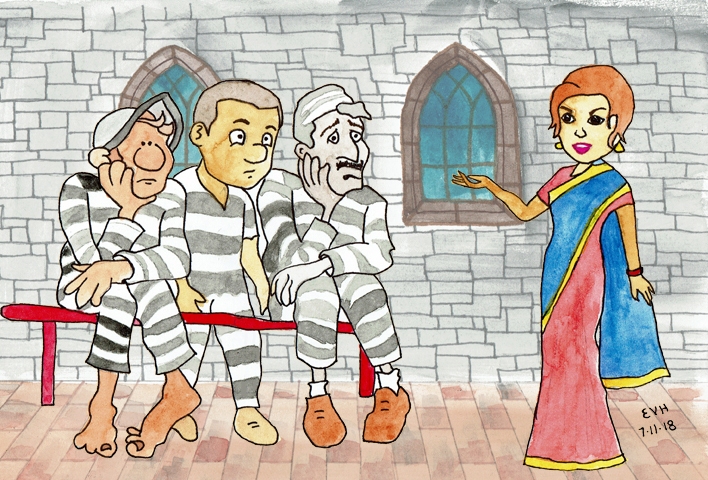
Jataka 67
Ucchaṇga Jātaka
The Tale of Logic
as told by Eric Van Horn
originally translated by Robert Chalmers, B.A., of Oriel College, Oxford University
originally edited by Professor Edward Byles Cowell, Cambridge University
This is another of these somewhat confused stories. But I think that ultimately we get the point. The woman in the story is praised for her logic and wisdom. There may also be overtones of Indian values, where the family is the most important thing in your life, although the son might be wondering about mother issues.
“A son’s an easy find.” This story was told by the Master while at Jetavana. It is about a certain country woman.
Once in Kosala there were three men ploughing a field on the outskirts of a forest. There were robbers there who plundered people in that forest and managed to escape. In the course of a fruitless search for the rascals, the victims came to where the three men were ploughing. “Here are the forest robbers, disguised as farmers!” they cried, and they hauled the trio off as prisoners to the King of Kosala.
Now there was a woman who came to the King’s palace repeatedly who cried loud lamentations begging for “the means to be covered.” Hearing her cry, the King ordered some clothing to be given to her. But she refused it, saying this was not what she meant. So the King’s servants went back to his majesty and said that what the woman wanted was not clothes but a husband. Then the King had the woman brought into his presence and asked her whether she really did mean a husband.
“Yes, sire,” she answered, “for a husband is a woman’s real covering, and a woman that lacks a husband - even though she wears garments that cost a thousand pieces - goes bare and naked indeed.”
Pleased with the woman’s answer, the King asked what relation the three prisoners were to her. And she said that one was her husband, one was her brother, and one was her son. “Well, to mark my favor,” said the King, “I will release one of the three. Which one will it be?”
“Sire,” she answered, “if I live, I can get another husband and another son. But as my parents are dead, I can never get another brother. So give me my brother, Sire.” Pleased with the woman, the King set all three men free. And so this one woman was the reason that the men were saved.
When the matter came to the attention of the Saṇgha, they were praising the woman in the Dharma Hall when the Master entered. Learning the topic of their conversation, he said, “This is not the first time, brothers, that this woman saved those three from peril. She did the same in days gone by.” And, so saying, he told this story of the past.
Once upon a time when Brahmadatta was reigning in Benares, three men were ploughing on the outskirts of a forest and everything came to pass as above.
Being asked by the King which of the three she would take, the woman said, “Cannot your majesty give me all three?”
“No,” the King said, “I cannot.”
“Well, if I cannot have all three, give me my brother.”

Figure: The Clever Woman and the Unfortunate Farmers
“Take your husband or your son,” said the King. “What does a brother matter?”
“I can readily replace a husband and a son,” the woman answered, “but I cannot replace a brother.” And so saying, she repeated this stanza:
A son is an easy find, a husband, too.
An ample choice throngs public ways. But how
Will all my efforts help me replace a brother?
“She is quite right,” said the King, well-pleased. And he ordered that all three men be released from the prison and given to the woman. She took all three of them and went her way.
“So you see, brothers,” the Master said, “that this woman saved these same three men from peril once before.” His lesson ended, he made the connection and identified the birth by saying, “The woman and the three men of today were also the woman and men of those bygone days, and I was the King.”
